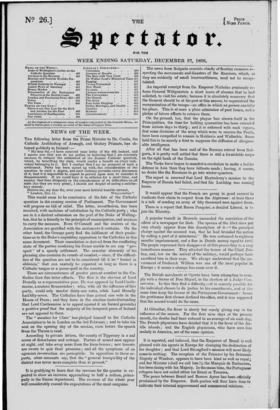THE following letter from the Prime Minister to Dr. Curtis,
the Catholic Archbishop of Armagh, and titulary Primate, has ob-
NEWS OF THE WEEK.
THE following letter from the Prime Minister to Dr. Curtis, the Catholic Archbishop of Armagh, and titulary Primate, has ob- tained publicity in Ireland:— "My dear Sir,—I have received your letter of the 4th instant, and I assure you that you do me justice in believing that I am sincerely anxious to witness the settlement of the Roman Catholic question, which, by benefiting the state, would confer a benefit on every indi- vidual belonging to it. But I confess that I see no prospect of such a settlement. Party has been mixed up with/the consideration of the question to such a degree, and such violence pervades every discussion of it, that it is impossible to expect to prevail upon men to consider it dispassionately. If we could bury it in oblivion for a short time, and employ that time diligently in the consideration of its difficulties on all sides (for they are very great), I should not despair of seeing a satisfac- tory remedy.
Believe me, my dear Sir, ever your most faithful humble servant,
" London, Dec. 11. WELLINGTON."
This would seem to be conclusive of the fate of the Catholic question in the coming session of Parliament. The Government will propose no bill of relief. The letter, nevertheless, has been received, with acclaims of satisfaction by the Catholic party ; who see in it a distinct admission on the part of the Duke of Welling- ton, that he is friendly to the principle of emancipation, and anxious to carry the measure. Even O'Connell and the orators of the Association are gratified with the sentiments it contains. On the other hand, the Orange party find the fulfilment of their predic- tions as to the Duke's unyielding opposition to the Catholics in this same document. Their consolation is derived from the conflicting state of the parties rendering his Grace unable to see any "pro- spect " of a speedy settlement. The oracular obscurity of his phrasing also contains its crumb of comfort, — since, if the difficul- ties of the question are not to be considered till it be " buried in oblivion," that can scarcely be expected so long as there is a - Catholic tongue or a goose-quill in the country.
There are circumstances of greater present comfort to the Ca- tholics than this letter affords. The first is the election of Lord Dunally as a representative peer. He was opposed by Lord Castle- • main, a zealous Brunswicker ; who, with all the influence of this party, could only muster thirty-one votes, while Lord Dunally had fifty-seven. The Catholics have thus gained one vote in the House of Peers ; and they have in the election (notwithstanding that Lord Castlemaine is to appeal against it on formal grounds) a positive proof that the majority of the temporal peers of Ireland are not opposed to them.
The " member for Clare" has pledged himself to the Catholic Association to be in London on the 3rd February ; and to take his seat on the opening day of the session,. even before the speech from the Throne is read.
According to private letters, the county of Tipperary is a sad 'scene of disturbance and outrage. Parties of armed men appear at night, and take away arms from the farm-houses ; new tenants are sworn to quit their premises ; and all the symptoms of an agrarian insurrection are perceptible. In opposition to these re- ports, other accounts say, that the " general tranquillity of the district was never more complete than at present."


















